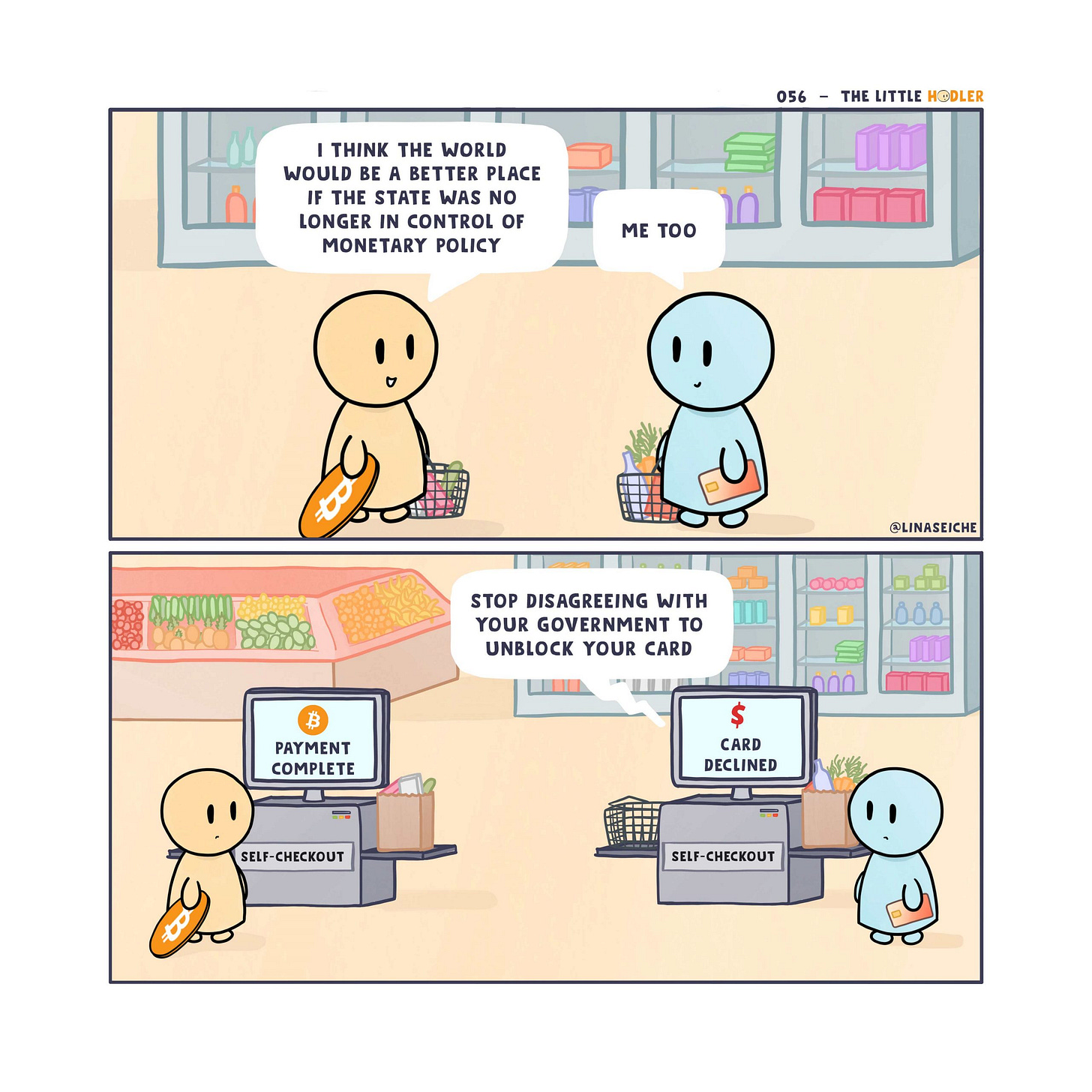Bitcoin Tech Talk #469
Interesting Stuff
Reality Slop - Freya India has a new article out, about the exhibitionism of the content that’s on most social media sites. As she points out, what was in another era a reason for in-person celebration is now part of the daily doomscroll. Our lives, in other words, have become entertainment. This debasement of life is profoundly sad, not just for the viewer, but for the producers of the content. Weddings, babies, and other life events are now drawn out with cliffhangers to get more views, and dramatized for monetization. Such exhibitionism should make us feel deeply uncomfortable, seeing moments that should be private and intimate, but alas, we’ve been desensitized from that long ago and it’s just meaningless background noise at this point. Life debasement is real and it’s only getting worse.
Parasite Theory of Behavior - Get ready to have your brain broken. This theory is controversial, but makes a lot of sense biologically. The main idea is that parasites change the behavior of the host to propagate themselves. This has been known with animals like rats, but as the article points out, certain kinds of parasites change behavior in humans as well. In particular, parasites that spread through sex modify the sexual behavior of the host. Of particular interest is how it affects homosexual men, as it’s well known they’re much more promiscuous than heterosexuals, and their infection rates of certain parasites are much higher than in heterosexuals. I’m sure there will be objections to the article, but the article brings the receipts.
Liberalism’s Grinder - A long, but exquisite read, which meanders into radical Islam, Asian American fiction, MFA programs and much more. The main thesis, though, is easy enough to articulate. There’s a liberal gatekeeping function in every educational institution, government institution and most large companies that work on the most radical and strong-willed individual. As the author points out, if the liberal hegemony can make suicide bombers into campus protesters in a single generation, what chance does any other culture have in surviving that meatgrinder? The cultural imperialism of fiat money is real, and the corresponding degeneration and conformity to the liberal order is insanely effective, at least in western countries where they have cultural supremacy.
Annoyance and Purpose - Follow your dreams. Do what you love. These are the platitudes that we’ve heard since we were kids, and it’s done a giant disservice to a generation of people, who feel depressed after burning out on their passion. As the article points out, the much better indicator of where your talents and emotions are best used is perhaps what you find annoying and feel the need to correct. The best and most effective in any field are constantly annoyed and it’s that energy, not some constant euphoric joy that drives them. It’s a much better way to look for where you can provide value and there’s definitely something true in this insight.
Consumption From Emptiness - Overspending is all too easy to do in a fiat economy, as debt is ubiquitous. The inflammation of mimetic desire through propaganda and the accessibility of these objects which bring us closer wreak havoc on our finances. Companies are only too eager to oblige in producing said propaganda and goods that substitute for this desire to be. This article points out that the all too familiar consumerist mentality of the typical fiat drone is rooted in a deep emptiness of values. The antidote to mimetic desire, in other words, is a spiritual centeredness.
What I'm up to
Charitable Giving - I talked with Jacob Lundskog about charitable giving and how to do it well. As he points out in the episode, some 99% of charities are not just inefficient, but often at cross-purposes with the intentions of the donor. It was an eye-opening conversation and given how we’re now hitting all time highs, this is hopefully advice you can use.
Dubai Blockchain Center - I talked with this UAE based show about the OP_RETURN/datacarriersize debate, what’s going on and how it’s going to resolve.
Why We Are Bullish - I was also on BTCSessions’ show to talk about various topics, which included UK crackdown on free speech, Canadian immigration and the left/right developer/pleb divide.
YAF Talk - I talked to some college students about Bitcoin and how it’s freedom from permission, confiscation and inflation and the coming financial violence that they can expect in their future. I got some interesting questions from them about Bitcoin, and hopefully helped them understand why it’s a necessary part of their future.
Nostr Note of the Week
What I’m Promoting
Bitcoin
The Case Against Node Running - This is a bit of a black pill post on running a node, but it really does point out the many problems, like bad UX. As the author points out, the software really isn’t that good, the privacy benefits useless without complete privacy hygiene, and the cost non-trivial. The post is a bit of a protest, essentially demanding better UX so that node running isn’t so painful. And to be honest, the author has a point. User friendliness has not been, in any way prioritized and if we’re hoping for real decentralization of verification, this needs to become a bigger priority than it has been.
Documentation Change - The un-deprecation PR has been merged this week, leading to a backport to v30rc2 and soon, v30rc3. The release of Core v30 has been delayed, possibly to October 12-15 range as testing commences on these release candidates. It really doesn’t look like the 100,000 byte default is going to change, even with Nick Szabo coming back to X to comment. There has been some talk of changing OP_RETURN to get the benefits of the witness discount (or remove the witness discount entirely), though.
Optimal Threshold - If you’re setting up a multisig wallet, how do you decide the k and n of k-of-n multisig? This paper attempts to answer that using a combination of threat models against theft and user error. The paper takes into account Taproot features like degrading multisig and figuring out what the optimal time intervals for the degradation might be based on the threat models. I like the formal approach and hopefully through analysis like this, we can get better and more justifiable setups for these setups.
Lightning
Disappointment in Lightning - Matt Corallo expresses some disappointment at how Lightning has turned out, with much of the original ethos going out the window in favor of trusted solutions. In particular, he singles out LSPs as regulated entities that become trusted third parties, which, while delivering good user experience, centralize significantly. This has been the lament that I’ve seen from a lot of Bitcoin devs, and there’s something deeply true of it. We went through multiple soft forks, including a very contentious 2017 block size war to get all the pieces needed for Lightning. If trusted solutions still ended up emerging, was the whole thing worth it?
Lightning as Value Transfer - Roy Scheinfeld of Breez writes this article about the speed and ubiquity of Lightning as the common language between many different second layer networks like Ark and Liquid and Cashu. The argument here is that the value transfer allows value to be unlocked in ways that the internet allows information to be unlocked. The suggestion being that the flow of value being much freer with Bitcoin means that more of the value can get to the more obscure places, unlocking the value-add such places can contribute. It’s a great essay and a hopeful understanding of all that Bitcoin will be able to do in the future.
Invoice Detective - Lightning payments are generally pretty good about anonymity, but not always. This project looks at invoices and figures out who’s getting paid. Before you decry such a project as needless, remember that chainalysis companies probably have something like this already, and defeating the digital footprints of tools like this becomes a good way to test potential privacy solutions.
Economics, Engineering, Etc.
GDP is Fake - This is a history and analysis of the most influential macro-economic number, the gross domestic product. I knew that the metric was corrupt, but I had no idea just how many fudge factors went into it until I read this article. Much like CPI numbers, there are arbitrary quality adjustments that can be inserted almost anywhere to make the numbers look good. And unsurprisingly, the government economists that produce these numbers almost invariably do make them look good. So GDP is a lie, and according to the article, it’s hiding the manufacturing decline, among other things. But then again, what did we expect? Fiat funded economists are going to say that fiat money is good for the economy or be out of a job.
Freedom Money - Alex Gladstein writes for The Journal for Democracy about the benefits of Bitcoin. In it, Alex points out the financial repression in various authoritarian countries around the world. He argues for Bitcoin as the solution for the financial repression. The arguments here aren’t new, per se, but this is a prestigious journal and articles like this are bound to be cited by researchers. It also gives a lot of credibility in academia to have articles like this, though it remains to be seen whether Bitcoin will be recommended by the typical ivory tower academic anytime soon.
Bitcoin Scholarship - If you’re attending college next fall looking to get into Bitcoin, you can apply for this scholarship from Chaincode Labs, which gives you a full ride to any university in the world. The main requirement is that you work at Chaincode during the summer before the year of college scholarship. Given how expensive college is, this may be a good deal. The deadline for application is next week.
Quick Hits
61,000 BTC - That’s how much the UK government seized from a Chinese national who scammed a bunch of people back in 2014-17.
NAKA Dashboard - The treasury company has released a pretty nice looking dashboard which reveals a higher than 1 mNAV as of publication.
Vietnam ID Law - Has gone into effect and as a result, 86 million bank accounts have been frozen.
Microsoft vs Treasury - Microsoft now has a bond yield *lower* than the US Treasury.
Fiat delenda est.







